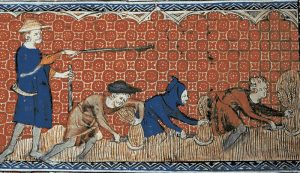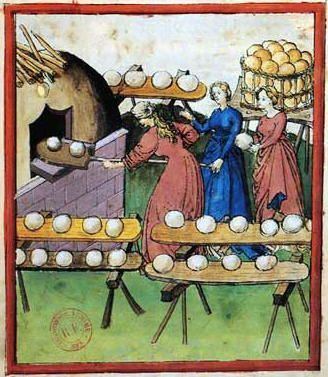
The difference between the free and unfree peasant on the English Manor was dramatic. While all had to pay rent, for the most part the responsibilities ended there for the freeman, with the exception of a few boon days required by everyone during harvest time. The serf, on the other hand, was obliged to dig into his pouch again and again; his obligations were so numerous it’s amazing he had enough left over to live on. And, because he was bound to the land, technically the lord owned everything—even the clothes on his back. Also, his children were the lord’s property, which made it a problem if one of them wanted to marry someone from another manor. Compensation had to be paid, for the lord would be losing potential income.
Here are the most common Obligations of the Serf:
– Had to pay a yearly rent
– Had to provide week-work (2-3 days a week or 3-5 days a week, depending on the season—and not always every week): ploughing, carrying, weeding, haying, cleaning, threshing, winnowing grain, trimming hedges, making fences, etc.
– Had to provide boon-work along with the rest of the population of the manor at harvest time: extra hands were needed to bring in the harvest, and were usually given meals and drink on the longest work-days. Needless to say, the serf’s own harvest was secondary
– Had to pay a yearly wood-penny for the privilege of gathering wood; he was not permitted to cut down any trees
– Had to deliver a hen or eggs at set seasons to the manor house for the privilege of keeping poultry
– When he sold an animal, he had to give the lord part of the purchase price
– Had to pay a fee when giving his daughter (and sometimes son) in marriage (known as merchet fine)
– Had to pay to let his son go away from the manor for education, or take holy orders
– Could only have his grain ground at the lord’s mill; he had to give up about 1/20th for the lord’s profit
– Could only bake his bread in the lord’s oven
– Responsible for “Tallage at Will”, a tax arbitrarily imposed by the lord whenever he needed money; by 1300 it started to become more fixed and only once a year.
– Responsible for “Heriot” to the lord, a kind of a death tax, where the survivor had to give up their best beast (I believe free peasants were often obliged to pay Heriot as well). Sometimes the widow additionally had to pay a “relief”, a cash sum allowing her to take over the holding (gersuma). At times, payment of Heriot left the widow so badly reduced in circumstances she didn’t have enough to survive on. That was too bad for her. I suppose she didn’t have much choice but find another husband. The widow usually retained a life interest in the lands held by her first husband; if she married again, the second husband gave up the holding at her death. The holding went to one of her children from the first marriage.
– Responsible for “Mortuary” to the church, a death tax where the inheritor had to give up their second best beast (as long as the deceased owned three or more).

According to H.S. Bennett, the imposition of all those fines and duties is what distinguished the serf’s servile status. As the author said in his Life on the English Manor, “although medieval England saw a large part of its population of servile condition, this state of affairs was not willingly assented to by the serfs themselves, and unceasing attempts were made by them to alleviate their condition.” As time went on (late 14th-early 15th century), it became easier for the villein to make a money rent in lieu of services. Manumission was the ideal way for a serf to gain his freedom. The exactions of the king, foreign wars, and the growing luxury of the aristocracy made the collection of annual rents more attractive to a landlord who was strapped for cash. But flight was not at all unusual if a serf had no family to be concerned about; without a doubt he would be forced to leave everything behind. Where could he go? Some traveled far and started a new life on another manor, but many found refuge in the local town; sometimes the town was right next door to the manor. How could he resist? The towns increasingly were buying their own freedom and establishing themselves as boroughs, and the inhabitants were free by extension. This offered a temptation to the villein, for often the serf and his skills were welcomed and the town would offer its protection.
If a serf ran away, the lord of the manor was allowed four days to pursue and bring him back. But after four days, things got more difficult for the lord; Bennett tells us, “by then he (the villein) was in possession libertatis—in other words, he had a seisin of liberty—and the lord would have to seek the aid of the courts to get possession of him.” Apparently, the courts tended to be in favor of the peasant and proceedings were stacked against the lord: “The courts of the fourteenth century and later were making it more and more clear that serfdom was repugnant to the law of England…”. Furthermore, if the serf found refuge in a Chartered Town or Royal Demesne, as long as he made himself useful by joining a guild or becoming a burgess, and if he lived there for a year and a day, he was essentially free and could not be claimed by the lord. But he must stay within the borough walls or he could be apprehended. Mere residence wasn’t good enough; he had to be willing to “accept communal burdens, and wishes to be part of the borough and not a mere parasite upon it” (i.e. pay taxes, etc.).
As I stated in Part 1 and Part 2, conditions on the English manor varied widely from place to place, and the end of the manorial system did not come about all at once. The Black Death and subsequent reduction of available labor made a big impact on the peasants’ circumstances, regardless of the government’s efforts to hold them back. The Peasant’s Rebellion of 1381 certainly made them a force to be reckoned with; though they were severely put down afterwards, it seems this was the beginning of the end for the manorial system. In another hundred years, the serf was destined to be replaced by the tenant farmer and small landowner.
One thought on “The English Manor Part 3: The Burden of the Serf”